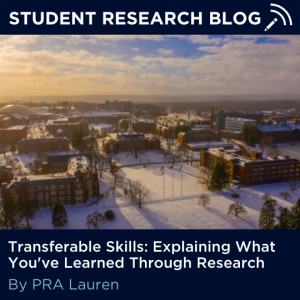By Lauren Rudin, Peer Research Ambassador
As a second semester senior, my time as an undergraduate researcher is reaching an end and I have given my future beyond UConn serious consideration. When reflecting back on my experience while completing medical school applications, I realized that the skills research provides are much richer than the ability to check off a box on any application.
We have all heard of transferable skills, but how do you explain the skills you’ve developed through research and apply them to other settings? While writing about projects, publications, and conference presentations in my primary application, I needed to decide which transferable skills, or core competencies as described by the Association of American Medical Colleges, to highlight and how these experiences will benefit me in my clinical education. Of course, scientific inquiry is applicable here, but I wanted to go beyond this competency and evaluate where else research is intertwined. Based on my independent research experiences working with the Institutional Review Board and leading projects, I chose to highlight “ethical responsibility to self and others” and “resilience and adaptability,” respectively, since as a researcher and a future physician I have an ethical duty to my participants and patients.
During an interview with a medical school, we discussed how my research experiences connect with the school’s mission as well as how I will take what I’ve learned from these experiences and apply them to my clinical work. In this response, I decided to approach the core competency “resilience and adaptability.” Instead of focusing on how I adapted my timelines and procedures according to the COVID-19 pandemic, I emphasized how the resilience that I built while conducting participant-based research during the pandemic has brought a greater awareness of the various life factors that contribute to participation in research. This experience adapting to participants’ schedules and discussing limiting factors in participant interviews will benefit me in building relationships with patients and in understanding how they prioritize health.
It’s not uncommon for undergraduate researchers to pursue medical school, but if you devote time to thinking critically about the skills you’ve gained through research it will allow research to apply to any graduate school or job application. For example, I am also applying to become an Educational Leadership Consultant for the sorority I am a member of, Alpha Omicron Pi, as an alternate plan for the 2022-2023 academic year. This position involves traveling to universities and aiding chapters in strengthening their leadership, recruitment, and function overall- completely unrelated to research. However, while completing the application, I illustrated how my research experience has strengthened my oral and written communication, collaboration, and social skills which are all essential for this position. Fortunately I received an interview invitation, and I hope to expand on how not only my sorority leadership but research leadership experiences will benefit me as an Educational Leadership Consultant.
As you prepare to or are applying to continue your education or join the workforce, take the time to consider where your research experience fits into the picture then paint it so that program or employer understands how valuable your research experience is and how well you’ll fit into your next endeavor.
Lauren is a senior majoring in Exercise Science and minoring in Biological Sciences. Click here to learn more about Lauren.